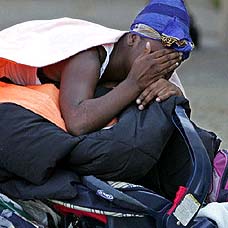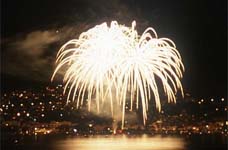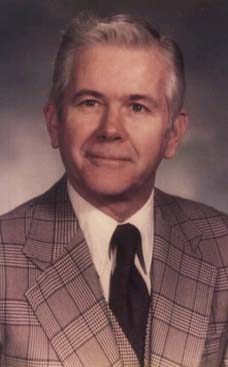
"It is a failure that, four years after the ouster of the Taliban, the United States and its allies have never provided the necessary military forces and other support necessary to force these old warlords out of politics," said a European diplomat. "Instead, we've forced [President Hamid] Karzai and the Afghan people to cut deals with them, and a number of them are going to turn up in the parliament to try to legitimize and solidify their hold on a big piece of political power here." Journalist James Rupert, head of Newsday's international bureau in Islamabad, Pakistan began his career abroad as a Peace Corps volunteer, teaching mechanics and welding in Morocco.
James Rupert says: The first parliamentary election in 32 years Sunday has given pro-democracy campaigners here much to celebrate
Vote raises hope, uncertainty
Afghanistan's first election in 32 years has 12 million citizens registered to vote, but warlords seek to legitimize grip on power
BY JAMES RUPERT
STAFF CORRESPONDENT
September 16, 2005
A man walks his donkeys past a huge election poster on the outskirts of Faizabad in Afghanistan. (Getty Images Photo)
KABUL, Afghanistan -- The first parliamentary election in 32 years Sunday has given pro-democracy campaigners here much to celebrate.
About 12 million Afghans, the vast majority of the country's adults, are registered to vote. And those interviewed by journalists and election observers say they are eager to choose a legislature to replace civil war as the forum for political debate.
The Bush administration, too, is lauding the election's virtual completion of a national government here that was designed under U.S. guidance to serve as a possible model for democracy in the Muslim world.
But if anything is as thick as the hope surrounding Sunday's vote, it is the uncertainty. Most voters interviewed say they are confused by the voting system and little aware of the candidates. Many local warlords are running for office, and Afghans and election monitors say strongmen are buying or bullying voters.
The revived Taliban insurgency has left more than 1,000 people dead this year, 10 of them yesterday. At least five candidates and four election workers have been killed ahead of the vote, officials say.
"We are not prepared for a free and fair election," said Shukriya Barakzai, a Kabul writer and women's rights campaigner who is one of an unprecedented wave of female candidates on the ballot. "After so much war ... our electoral system has not excluded men from trying to legitimize the power they have seized with guns" and money from drug-dealing, she said.
Officials of the United Nations, which is running the election jointly with an independent Afghan electoral commission, told reporters that a "free and fair" vote is not really possible, and that a "credible" and "legitimate" one is their goal.
Establishing a viable parliament is vital to the U.S. effort to rebuild an Afghan state and government after this country served as a base for Osama bin Laden to plan the Sept. 11, 2001, attacks on the United States.
While there is no true national mass media, let alone any way of polling Afghans, there is every indication that people want urgently to exclude from power the faction leaders from more than 20 years of civil war. Many of them still head powerful local militias, despite a vigorous campaign to disband them.
The election law bars candidates with links to "unofficial ... armed groups." A committee of officials from military and intelligence agencies, including the Afghan and U.S. militaries and NATO peacekeeping forces, was given the job of recommending which candidates should be barred. Afghan and Western officials say the committee, called simply the Joint Secretariat, balked at excluding two groups of militia commanders: those it feared would lash back with attacks on Afghan or foreign targets, and those whose cooperation is needed for U.S. and Afghan military and intelligence operations.
Controversial commander-candidates include Abdurrab Rasul Sayyaf, who led a militant Muslim faction fighting the Soviet Union in the 1980s. Another is Hazrat Ali, in the eastern province of Nangarhar. He has cooperated openly with U.S. forces against al-Qaida but is seen as undermining the Afghan government with corruption and secret opium exports - charges he denies. Human rights groups have called for both men to be disqualified.
In July, when election officials announced that 11 militia leaders among the 2,800 parliament candidates had been disqualified, criticism by Afghans was widespread. Many of the remaining candidates "are known criminals whose hands are stained with the nations' blood," declared Kabul newspaper Erada.
Scholars, newspaper editorials and human rights groups protested that the new parliament was being surrendered to warlords. On Monday, election officials announced 21 more men had been disqualified. That raised a new storm, as the names will remain on the ballots, which were printed long ago. In a country that lacks mass media or even telephones and roads, it will be impossible to inform voters widely about who is no longer a legal candidate.
"It is a failure that, four years after the ouster of the Taliban, the United States and its allies have never provided the necessary military forces and other support necessary to force these old warlords out of politics," said a European diplomat. "Instead, we've forced [President Hamid] Karzai and the Afghan people to cut deals with them, and a number of them are going to turn up in the parliament to try to legitimize and solidify their hold on a big piece of political power here."












